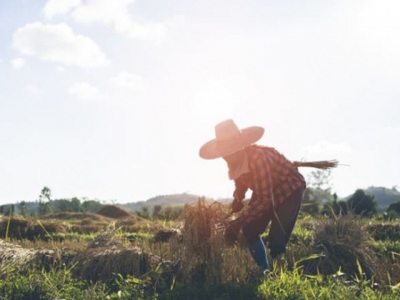Thailand start-up says its boosting crop yields with app for farmers

After returning from the United States, Unahalekhaka and Usman Javaid, whom he met at MIT, co-founded Ricult in 2016. The start-up aims to improve the livelihoods of farmers in Thailand and Pakistan.
A farmer in a rice field in Thailand. Photo: Pipat Yapathanasap/iStock
+ Thai start-up Ricult is trying to help small farmers in Thailand and Pakistan improve crop yields using artificial intelligence and machine learning.
+ The app has signed up almost 400,000 farmers in Thailand, according to Ricult.
+ It analyzes weather patterns and advises farmers on when they should start putting their seeds into the soil and when to add fertilizer.
Thailand’s start-up scene is giving birth to a new breed of tech entrepreneur - such as Aukrit Unahalekhaka, who came up with the idea of creating an app that helps small farmers boost yields using artificial intelligence and machine learning.
After returning from the United States, Unahalekhaka and Usman Javaid, whom he met at MIT, co-founded Ricult in 2016. The start-up aims to improve the livelihoods of farmers in Thailand and Pakistan.
His partner handles the business in Pakistan, while Unahalekhaka oversees Thailand, where he is focusing on the central provinces of Lopburi, Saraburi and Korat, working with corn and cassava farmers in particular.
400,000 farmers
Ricult’s mobile app has so far signed up almost 400,000 farmers in Thailand, according to Unahalekhaka.
“In the past two years, we have worked a lot with the central banks and many research institutions. We have shown that our technology has increased the farmers’ income by at least 50%, as a baseline,” Unahalekhaka told CNBC’s “Managing Asia.”
The Ricult app gives farmers access to data to help them make better decisions throughout the farming cycle. The platform analyzes weather patterns and advises farmers on when they should start putting their seeds into the soil and when to add fertilizer.
But getting farmers in Thailand to adopt the new technology wasn’t easy.
“Bringing in new technology to totally change the way they farm was initially a challenge,” Unahalekhaka said. But after spending time shadowing farmers, “I realized how to convince them and how to make the app easy for them to use, and [how to be] able to convince them.”
The app addresses a serious problem that farmers face — yearly droughts and bad weather conditions, which have led to a decline in crop yields. Because of those risks, it’s difficult for farmers to get reliable capital — and Unahalekhaka said some end up going to loan sharks.
“By having our data platforms, the banks can ... understand the risk profile of the farmers better with our credit profiling,” said Unahalekhaka, who said the app has helped banks “provide affordable loans to the farmers at a fair rate.”
Broker model
Ricult does not charge farmers for the app. Instead, it collects fees and commissions from banks when they apply for a loan.
Unahalekhaka said he’s careful to protect that kind of personal data in light of Thailand’s Personal Protection Act, which the government is due to begin enforcing by June next year. (The act’s provisions have been established, but in the wake of the pandemic, companies in Thailand asked the government to give them time to prepare internal processes.)
Unahalekhaka said he gets farmers’ consent before sending such information to banks, insurance companies and crop buyers.
Ricult is growing fast, and Unahalekhaka said he has plans to expand into Vietnam and the Philippines. With the Bill & Melinda Gates Foundation as one of its backers, he is speeding up his capital-raising exercise.
Unahalekhaka said the company hopes to be profitable by next year. “We want to open up our Series A round next year to investors” who believe in Ricult’s vision, he said.
Fertilizer shortage could impact crop yields over the next year
Experts are warning that the dual energy and supply chain crises could serve to significantly disrupt global crop production, potentially disrupting food supplies for poorer consumers in particular.
Those ongoing crises are helping to temporarily decrease the global supply of fertilizer, a critical component in much of world agriculture and one that allows farmers to grow considerable quantities of crops in much of the world’s soils.
The fertilizer shortage is “impacting food prices all over the world and it hits the wallets of many people,” Yara International Director Svein Tore Holsether told the BBC this week.
“But for some people, especially in the developing world, this is not only a question about the wallet, but it's a question of life or death."
Fertilizer production depends in particular on natural gas, which has been in shorter supply over the past year due to a variety of supply and demand issues, many of them related to the pandemic.
Có thể bạn quan tâm
 Online trade promotion - Many new points to increase export efficiency
Online trade promotion - Many new points to increase export efficiency Online trade promotion activities in 2021 have many innovative points, helping enterprises to promote exports in the context of the Covid-19 pandemic.
 Rice export firms worry about high input prices
Rice export firms worry about high input prices After a slight decrease in volume and a slight increase in export value in the first 10 months of 2021, the prospect of rice exports
 Biotechnology helps to conserve rare orchid genes
Biotechnology helps to conserve rare orchid genes The Institute of Agricultural Science and Technology of the South Central Coast applies tissue culture technology to preserve the genetic resources of rare